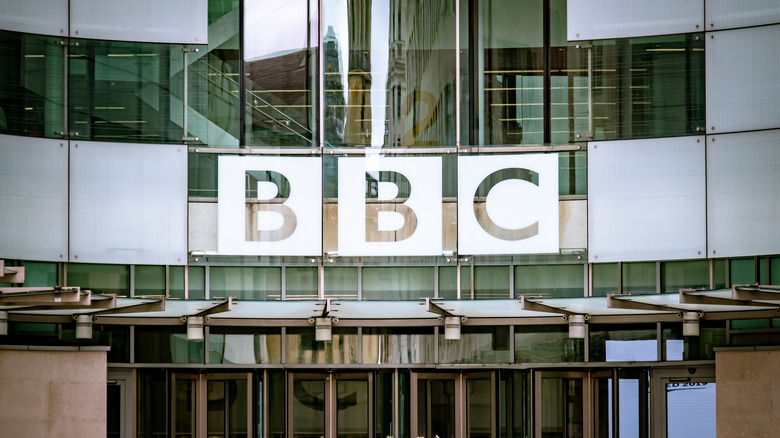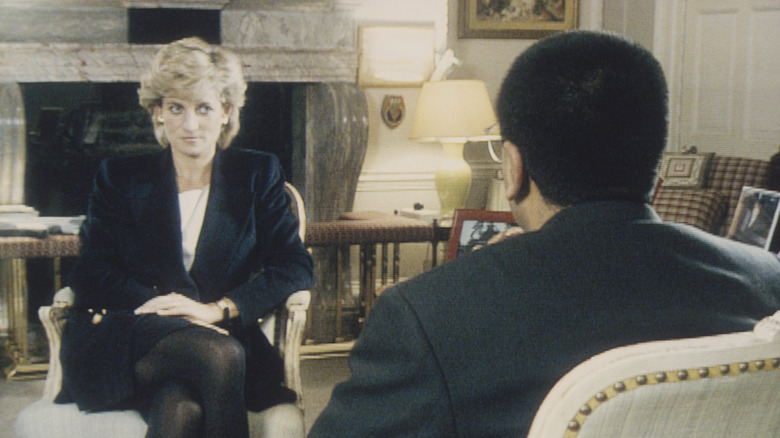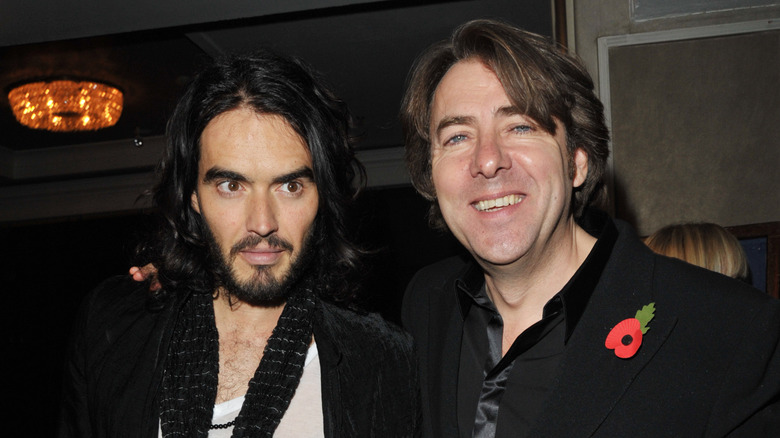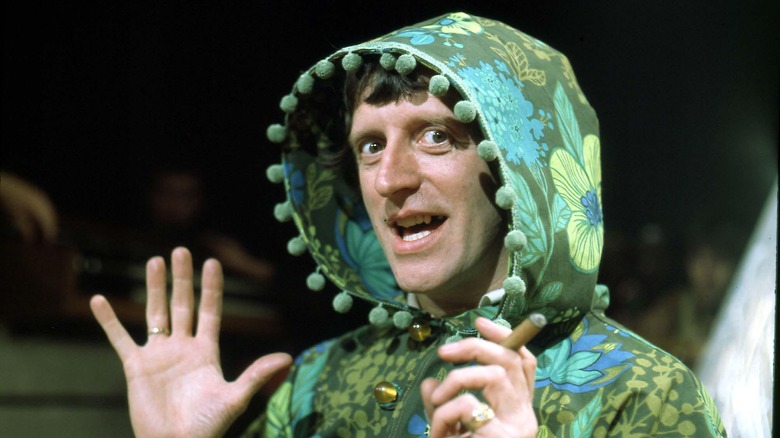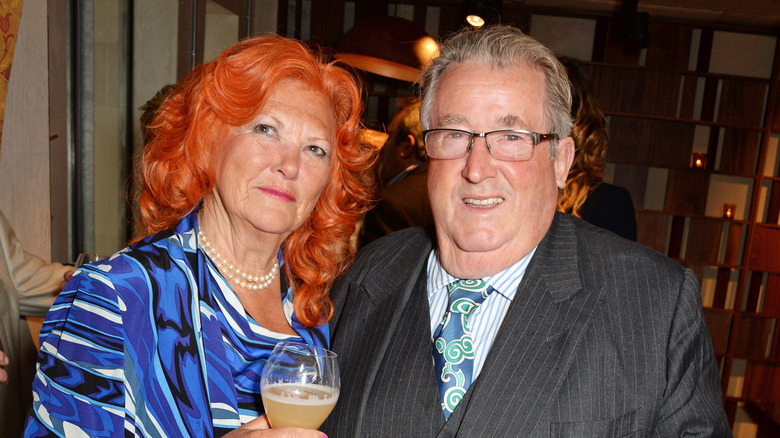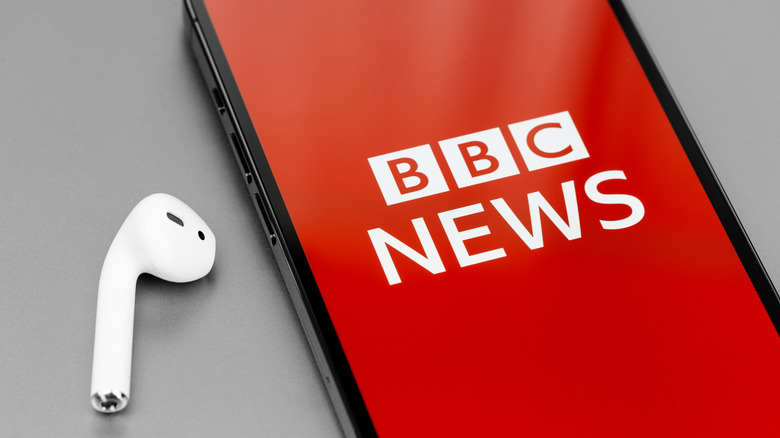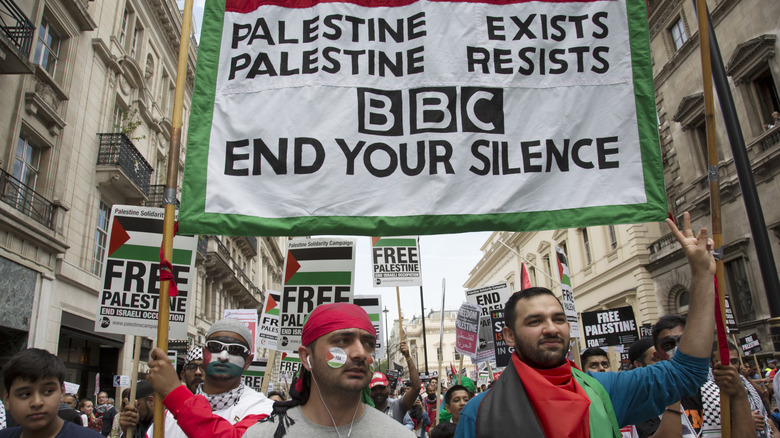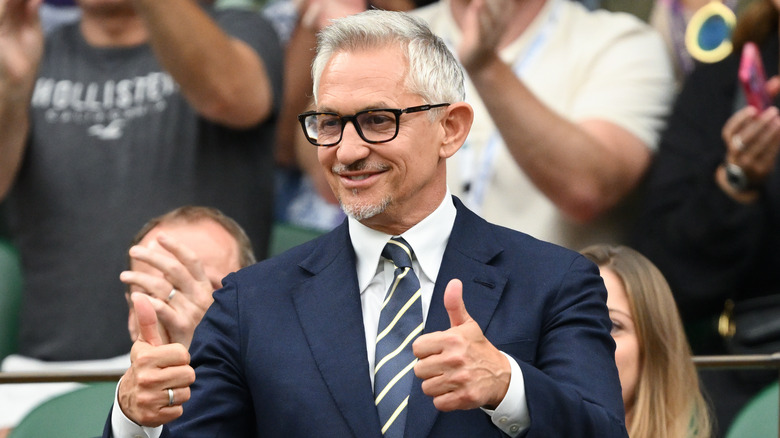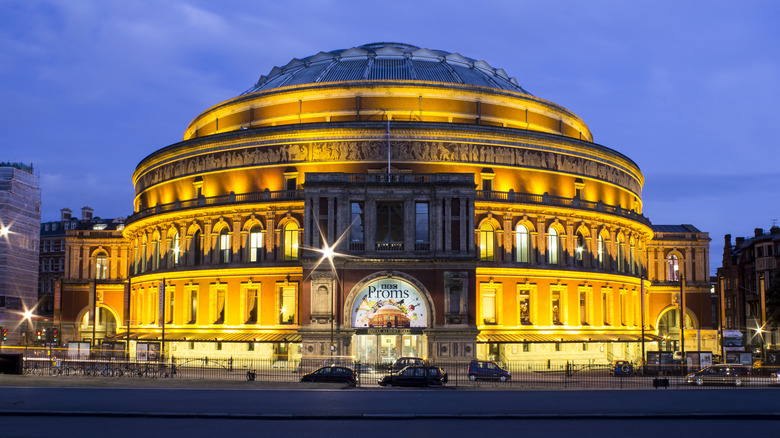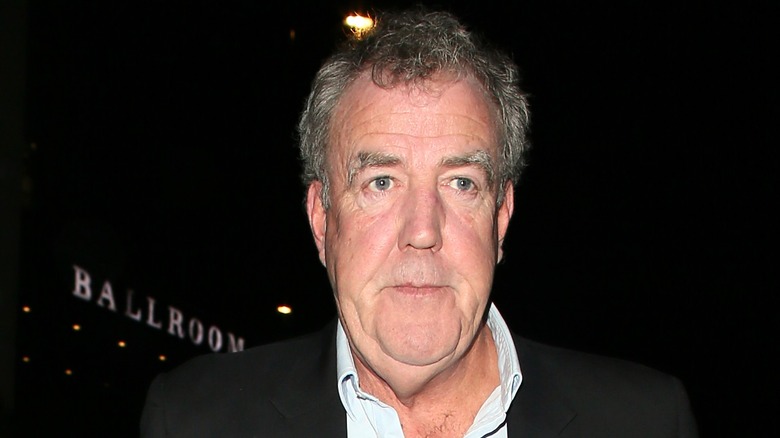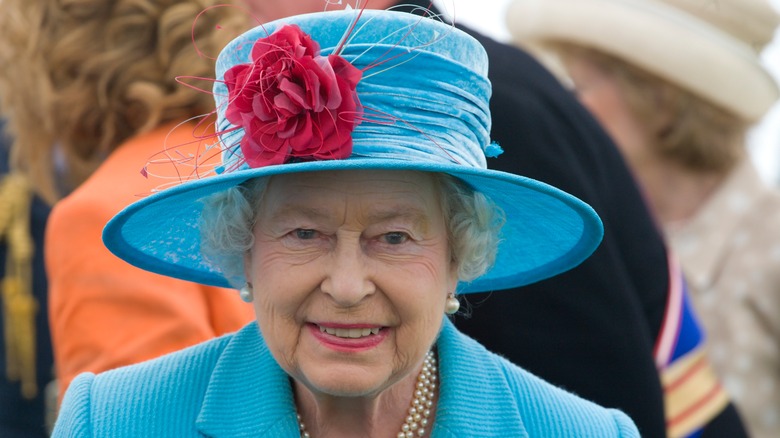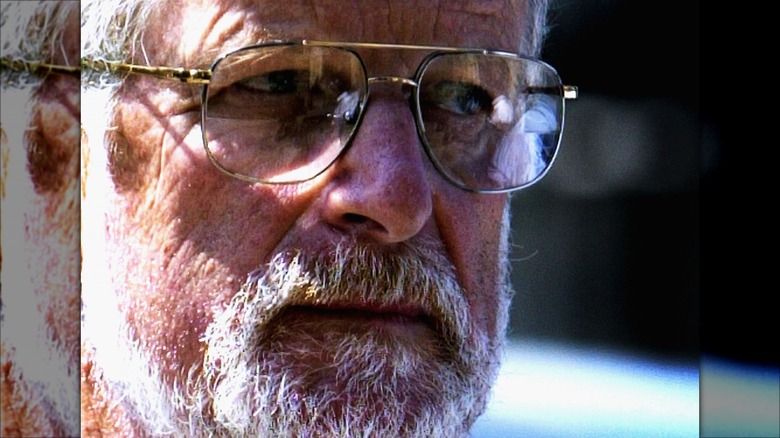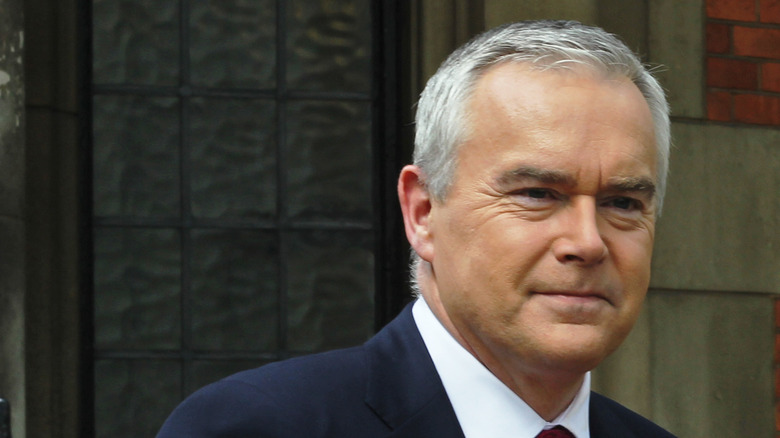12 Biggest Scandals To Hit The BBC
The British Broadcasting Corporation, more commonly known as the BBC, is an institution that has brought radio and TV to the UK and beyond for decades. Created under royal charter, its brief remains, as it did from its inception, to provide "distinctive output and services which inform, educate, and entertain."
It has also proven to be one of the U.K.'s most successful exports. Many of its shows, such as "Dr. Who," "Sherlock," and the nature documentaries of Sir David Attenborough, are admired the world over, and bring the broadcaster a great deal of revenue through syndication while also promoting British art and culture to the world at large.
But despite its renown, the BBC has had a troubled history. Nearly every British home with a television set pays a license fee, which directly funds the BBC. This means that, when it screws up, it can lead to something of a "kerfuffle." (That's British for a ruckus.) To demonstrate, here are some of the major scandals that the BBC has had to deal with in the last few decades.
Martin Bashir's Princess Diana Interview
Throughout its existence, the BBC has been renowned for securing groundbreaking interviews with some of the biggest names on the planet, especially royals. The BBC's former "Newsnight" anchor Emily Maitlis' 2019 interview with Prince Andrew, for example, which delved into his friendship with the sex offender Jeffrey Epstein, is a recent example that made headlines around the world upon its release.
Another of the corporation's top reporters was Martin Bashir, whose exposé of the pop star Michael Jackson in 2003 led to intense scrutiny of Jackson's private life and made Bashir a central figure in the tabloid fallout that followed. But Bashir's reputation was established almost a decade earlier thanks to a 1995 interview he secured with Princess Diana. At the time, Diana was going through a tumultuous divorce from Prince Charles, now King Charles III, and Bashir's interview with her for the BBC's "Panorama" program gave an unparalleled glimpse into the inner workings of the royal family at a time of crisis.
However, a recent investigation has concluded that Bashir had secured his interview with the use of false documents, which he had shown to Diana's brother, Earl Spencer, to gain his trust. The BBC had found out about this deception early on, but had covered up its knowledge due to the popularity of the interview, and in doing so had failed to maintain its own "high standards of integrity and transparency," the investigation found. More recently, Jackson's family has joined the chorus of condemnation against Bashir, claiming that his interviews with the late pop star were also based on deceit.
Manuelgate
2008 was the year that the BBC saw the downfall of two of its biggest stars, who, though they would go on to have glittering careers going right up to the present day, would never have a primary home at the broadcaster again. At the time, stand-up comedian and actor Russell Brand's career was in the ascendency, and along with his TV appearances, he enjoyed a loyal audience who tuned in to his weekly BBC radio show, famous for its edgy humor and prank phone calls.
But eventually Brand went too far. During one show, Brand, along with special guest Jonathan Ross — a famous BBC face in his own right — made an obscene phone call to the actor Andrew Sachs, best known for portraying the waiter Manuel in the John Cleese comedy "Fawlty Towers." Leaving a message on Sachs' answer machine, the two informed Sachs that Brand had previously had a sexual encounter with Sachs' granddaughter. More cruel than that, the two comedians then went on the speculate that the information they had just given to Sachs might drive him to suicide.
The public outcry against Brand and Ross' behavior toward a popular and elderly actor was immense. Within days, Brand was forced to resign from the BBC, while Ross received a three-month suspension. The BBC itself received a fine for broadcasting offensive content.
If you or someone you know is struggling or in crisis, help is available. Call or text 988 or chat 988lifeline.org
The Jimmy Savile revelations
Though little known outside his native U.K., Sir Jimmy Savile was a household name to most Brits, who, over the course of a long career at the BBC, had been the host of some of its most popular and enduring flagship shows. He was also famous for the enormous amount of charity work and philanthropy he engaged in over the years, particularly for hospitals.
Savile died in 2011, prompting a wave of mourning throughout the nation and loving dedications broadcast to him on the BBC. However, that admiration soon turned to revulsion with the revelation that the seemingly caring and charitable Savile had in fact used his power and privilege in the BBC to sexually exploit vulnerable people he came into contact with, and that he had been a calculating sex offender hiding in plain sight for decades. Scores of victims have since come forward since the story broke just months after his death, with investigators claiming that the previously popular TV presence may in fact have been one of the most prolific sex criminals in the country's history.
And what has made the Savile scandal even more disturbing is the fact that his behavior was an open secret, with many ex-colleagues now claiming that his predilections were well known by BBC executives. Another thread of scandal broke shortly after his crimes were revealed, with the information that the broadcaster had canned an exposé of Savile, choosing instead to air a tribute celebrating his life and career.
If you or anyone you know has been a victim of sexual assault, help is available. Visit the Rape, Abuse & Incest National Network website or contact RAINN's National Helpline at 1-800-656-HOPE (4673).
False allegations against Lord McAlpine
The revelations about Jimmy Savile's widespread sexual crimes caused a moment of reckoning for the BBC, which faced accusations of being an enabler for a rapist. But Savile wasn't the only star to be revealed as a sexual predator. In the months that followed, the British police launched an investigation, Operation Yewtree, into Savile's crimes and those of others both living and dead, with many former BBC presenters, such as Rolf Harris and Stuart Hall, eventually facing justice for past crimes.
But the post-Savile climate also led to some injustices, in part as a result of how the broadcaster attempted to be objective in its coverage of the scandal that it was at the constant heart of. Looking to stay ahead of the story, the BBC itself was responsible for breaking a story alleging sexual misconduct by a person it identified as "a leading Conservative politician from the Thatcher years." "After Savile ... if we'd dropped a story about a pedophile and Channel 4 had run it we'd have looked like idiots," one source told The Guardian.
Online sleuths later identified former Conservative party treasurer Lord McAlpine (pictured), who found himself suddenly vilified, but it was later revealed that the allegations were a case of mistaken identity. The corporation was made to pay £185,000 in damages to the politician it had wrongly outed as a pedophile, while the chairman of the BBC and other executives responsible lost their jobs.
The gender pay gap scandal
The BBC has also faced scrutiny concerning the salaries that it pays to its highest-earning stars. In July 2017, it was revealed that a gulf existed between male and female presenters at the corporation, and that of the top seven earners among its camera-facing employees, not a single one of them was a woman, despite female presenters occupying some of the most prominent positions in the BBC's flagship shows.
In 2020, The Guardian revisited the BBC's gender pay gap scandal and found that the broadcaster had indeed taken action regarding the imbalance in pay between its male and female staff. Their report, based on a freedom of information request filed by ex-employee Caroline Barlow, who was awarded a £130,000 settlement after the revelation of unequal pay at the BBC, found that around 700 female members of staff had been awarded raises in the aftermath of BBC salary details being made public. However, it also found that men within the broadcaster had also benefited from raises during that time, indicating that not all the raises in question were directly linked to efforts to attain parity between male and female staff.
Was the BBC's coverage of the Gaza conflict biased?
The ongoing conflict in the Gaza Strip between the State of Israel and the Palestinian Authority has understandably remained a constant story in BBC news reporting. However, as a publicly funded body, the corporation is expected to abide by a policy of neutrality when it comes to political and diplomatic conflicts, and in 2009, concerns over how the organization seeks to achieve balance in its Gaza reports came to a head, leading to sustained criticism from many commentators.
The BBC has faced several backlashes from across the political spectrum, with accusations of both pro-Palestinian and pro-Israeli bias over the years. In an attempt to minimize further hostility, the broadcaster made the decision not to air an appeal on behalf of the Disasters Emergency Committee, an aid coalition, which came in the wake of a sustained three-week Israeli assault on Palestinians, which led to 1,300 deaths and 5,000 casualties. The appeal, however, was aired by other British broadcasters, prompting accusations that the BBC was out of step.
The decision attracted widespread protests, including a sit-in at the BBC's offices and thousands of complaints from the general public, and was also condemned by senior members of the Church of England.
The suspension of Gary Lineker
The BBC's attempts to maintain journalistic impartiality have also caused friction among its most prominent stars, most notably Gary Lineker OBE, an ex-England soccer player who fronts the BBC's sports coverage, which caused a major crisis for the corporation in March 2023.
Lineker has long been a critic of Britain's conservative government, especially its strict immigration policy and opposition to refugees crossing the English Channel in small boats from France. However, he was deemed to have overstepped the mark when he tweeted his opposition to what he described as the government's "immeasurably cruel policy [aka the Illegal Migration Bill] directed at the most vulnerable people in language that is not dissimilar to that used by Germany in the 30s." In response, the BBC called for Lineker to "step back" from hosting duties while they undertook an investigation into whether the tweet had contravened the broadcaster's impartiality rules for freelance staff.
However, the move triggered an unprecedented crisis for the BBC, when Lineker's colleagues on the sports coverage team, such as ex-soccer-playing pundits Ian Wright and Alan Shearer, stood in solidarity with Lineker and refused to step in and take up hosting duties in his absence. Soccer coverage on the popular "Match of the Day" highlights show therefore went ahead with no commentary, while other sports coverage was shelved at the last notice. Lineker was soon reinstated, with BBC director general Tim Davie apologizing for how the corporation had mishandled the situation.
The Rule, Britannia! scandal
Another major institution in British broadcasting is the Proms, an annual series of classical concerts broadcast live on BBC Radio 3 and also shown on television. But in 2020, the BBC was criticized after announcing that the climactic "Last Night of the Proms," which traditionally features patriotic songs such as the singalong "Rule, Britannia!" would go ahead without the usual choir of vocalists, which some interpreted as an attempt to play down the colonial associations of the song, which are especially prominent in its lyrics.
The broadcaster was adamant that the decision to curtail the lyrics of "Rule, Britannia!" had not been made in the spirit of political correctness. Rather, the 2020 Proms were facing the logistical problem of attempting to host concerts in the middle of the COVID-19 pandemic, and to adhere to the British government's strict social distancing rules. Group singing was considered to be especially dangerous, which the BBC said was the reason that the performance would lack the vocals in question.
Nevertheless, the decision unleashed an outcry, with the prime minister himself, Boris Johnson, criticizing the decision to forego singing. In the end, the show went ahead with a smaller choir, the orchestra made up of 65 musicians instead of the usual 300, in what the BBC's arts editor Will Gompertz described as a "subdued" event. The Proms have also been the site of protests over the years, with pro-EU groups using the occasion to fly European flags at the famously patriotic event.
The Clarkson punch
For many years, the BBC motoring show "Top Gear" was one of the jewels in the broadcaster's crown, attracting a vast and loyal viewership of motorheads from around the world. Chief to its appeal was the charisma of its presenting team, headed by outspoken journalist Jeremy Clarkson, as well as James May and Richard Hammond.
Clarkson et al. were famous for courting controversy, especially in terms of some of the jokes they made during the show itself. In 2006, for example, Clarkson was reprimanded for comments he had made which an investigation deemed to be homophobic. In other incidents, Clarkson has also been accused of racism. Nevertheless, he and his colleagues managed to deflect the criticism and keep "Top Gear" on the road.
That was until 2015, when Clarkson reportedly punched one of the show's producers, leading to his suspension and the final two episodes of the series being dropped. Though an online petition calling for his instant reinstatement attracted tens of thousands of signatures, Clarkson was fired from the BBC, with May and Hammond joining him to launch a new show, "The Grand Tour," on Amazon Prime. He has since presented "Who Wants to Be a Millionaire?" and "Clarkson's Farm," for ITV and Amazon Prime, respectively.
The Queen clip controversy
In case the extensive coverage of the Platinum Jubilee and her state funeral didn't make it clear, the British public at large maintained great affection for Queen Elizabeth II. So when the BBC was accused of having both misrepresented and personally offended her, it landed the corporation in very hot water.
In 2007, the BBC put out a trailer for an upcoming documentary, "A Year With the Queen," which promised unfiltered access to the monarch and the royal family. In it, the queen is shown arguing with the photographer Annie Leibovitz over the outfit she was to wear for a photo shoot, and then appears to storm out. However, the footage was later revealed to be misleading, with the clip of her appearing to leave actually having occurred prior to her disagreement with Leibovitz.
The fallout from the scandal included several resignations, including that of BBC One controller Peter Fincham, while an internal investigation into the broadcaster in response to the offending clip highlighted "misjudgements, poor practice, and ineffective systems" within the corporation, though ultimately found that no one had "consciously set out to defame or misrepresent the queen[.]"
The death of Dr. David Kelly
In 2002, the British government — which had closely aligned itself with U.S. foreign policy in the aftermath of the terror attacks of September 11, 2001 — released a dossier that decisively claimed that Iraq was harboring weapons of mass destruction, justifying a joint invasion of the country by American and British forces.
That dossier, however, later came under scrutiny after a 2003 BBC investigation determined that its findings had been embellished and that the military threat of Iraq had been purposefully exaggerated to justify the invasion. The findings were a bombshell, but the investigation was later criticized when one of its alleged key sources, Dr. David Kelly, a weapons expert within the British military, was thrust into the spotlight after his identity was exposed in the newspapers.
Tragically, Kelly — who'd suddenly found himself the center of the nation's attention – died by suicide shortly after. While the incident remains highly controversial in terms of the factors that led to Kelly's death, some outlets such as The Guardian have claimed that the BBC was implicated for failing to protect his anonymity as a source.
If you or someone you know is struggling or in crisis, help is available. Call or text 988 or chat 988lifeline.org
The Huw Edwards scandal
A fresh crisis erupted for the BBC in July 2023, when veteran news anchor Huw Edwards — who has been one of the broadcaster's most prominent figures for many years — was outed as the celebrity at the center of a sex scandal in which he was accused of soliciting sexually explicit images from an underage person.
The allegations were first made public by a British tabloid newspaper, which, due to libel laws, was unable to name Edwards directly, leading to a wave of speculation as to who the article in question concerned. The BBC released its own statement saying that an internal investigation was underway, though it was only days later that Edwards himself was named, causing an uproar among many celebrities who were wrongly identified as being at the center of the story. The BBC was especially damaged by the detail that the organization had previously been contacted by the young person's parents, who claimed the corporation had done little to address the issue, prompting them to take the story to the tabloid press.
Once again, the BBC found itself having to report on a scandal in which it was a main player. Seemingly trying to get ahead of the game and avoid accusation of a cover-up, the broadcaster gave the story wall-to-wall coverage, uncovering new allegations against Edwards while also reporting the unexpected development that both the young person he was contacting and the police who had investigated the incident claimed Edwards had in no way acted unlawfully. The long-term effect on Edwards' career at the BBC remains to be seen.
